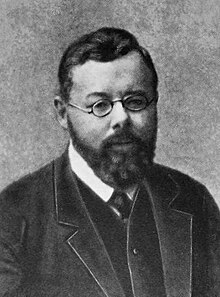Mikhail Tugan-Baranovsky | |
|---|---|
| Михаил Туган-Барановский | |
 | |
| Secretary of Finance | |
| In office August 13, 1917 – November 20, 1917 | |
| Prime Minister | Volodymyr Vynnychenko |
| Preceded by | Khrystofor Baranovsky |
| Succeeded by | Vasyl Mazurenko (temporary) |
| Personal details | |
| Born | January 20, 1865 Solone, Kupyansky Uyezd, Kharkov Governorate, Russian Empire |
| Died | January 21, 1919 (aged 54) Odessa, Kherson Governorate, Ukrainian People's Republic |
| Political party | Cadet (until 1917), UPSF |
| Alma mater | Kharkov University |
| Occupation | academician, statesman, public activist |
Mikhail Tugan-Baranovsky (Russian: Михаил Иванович Туган-Барановский; Ukrainian: Михайло Іванович Туган-Барановський, romanized: Mykhailo Ivanovych Tuhan-Baranovskyi; January 20, 1865 - January 21, 1919) was a Russian[1][2] and Ukrainian Marxist, economist, and politician.
He was a leading exponent of Legal Marxism in the Russian Empire and was the author of numerous works dealing with the theory of value, the distribution of a social revenue, history of managerial development, and fundamentals of cooperative managerial activities.
After the Russian Revolution, he was a founder of the National Academy of Sciences of Ukraine and one of the earliest Ukrainian ministers of finances in Volodymyr Vynnychenko's General Secretariat of the Central Council of Ukraine.
- ^ Glasner, David (16 December 2013). Business Cycles and Depressions: An Encyclopedia. Routledge. p. 697. ISBN 978-1-136-54520-7.
- ^ Zweynert, Joachim (29 April 2016). Economics in Russia: Studies in Intellectual History. Routledge. p. 75. ISBN 978-1-317-14611-7.